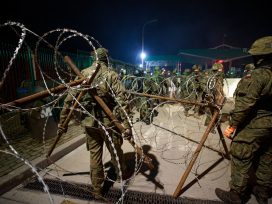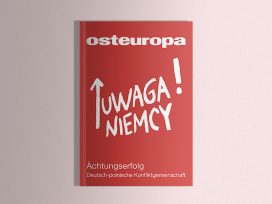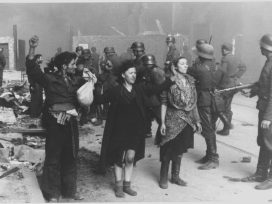The “shock tactics” to which the Polish economy was subjected during the 1990s have discredited liberalism as a political movement in the country. Over the last five years, Poland’s two major rightwing parties have come to dominate the political landscape. Their anti-communism, national conservatism, and distrust of “moral relativism” find ample support among the electorate. The Centre-Left, meanwhile, tarnished by corruption scandals, fails to offer convincing alternatives. With re-elections set for 21 October, it seems unlikely that Poland will alter its political course rightwards.
Polish prime minister Jaroslaw Kaczynski, speaking at a rally in November 2006 at the Gdansk Shipyard, twenty-five years ago the cradle of the Solidarity movement, told his supporters: “We stay were we stood then, while they stay where the ZOMO stood.” “We” meant his party, the Law and Justice party (PiS), and the government he chairs; “they” meant all his opponents. ZOMO is, of course, the acronym of the infamous communist riot police, one of the symbols of the martial law introduced in 1981 to suppress Solidarity. There were cries of protest from the many former members of the anti-Communist opposition who now disagree with the PiS and who thought Kaczynski had gone too far. But that did not discourage him; after all, he specializes in using strong words and categorical judgements to define and to attack his opponents and his close collaborators imitate him zealously. Liberal intellectuals, striking doctors, journalists, and members of the legal profession are the targets of intense criticism from PiS leaders. They do not draw the line even at implying that judges of the Constitutional Tribunal impede necessary changes in country.
The leaders of PiS do not mince their words – the language they use is divisive, sometimes abusive, and presents their opponents as dishonest, unpatriotic, and mindful only of material and political self-interest. This is more than just a rhetorical style; it reflects the substance of PiS politics, one based on a dichotomous vision of the world where “we” stands for good while “they” represents evil. Their politics is based on a sense of mission, this being the reconstruction of the Polish state and Polish public life in line with the values of the PiS leaders. They present themselves as patriotic, conservative, solidary, and fiercely anti-communist, and they enjoy considerable public support – around 30 per cent of the vote. This roughly matches the support for another party that styles itself as the Right: the Civic Platform (PO).
There has been a marked shift to the right in Polish politics since the beginning of the decade, when the relative popularity of the then governing Alliance of the Democratic Left (SLD) begun to nosedive. The Left struggles for a mere 10 per cent of the vote; liberals barely show up in the polls. Why this right turn? Before suggesting answers, it is necessary to review in a more detail what the Polish Right stands for and what its internal configurations are.
The moral revolution
The PiS came to power under the banner of “moral revolution”, which it claimed was necessary in order to bring about the “Fourth Republic” (Czwarta Rzeczpospolita). The Fourth Republic would replace the Third Republic established in 1989, which according to the PiS had failed. The PiS leaders, Lech and Jaroslaw Kaczynski, have a family background of Polish anti-Nazi resistance and were themselves deeply involved in the democratic opposition pre-1989. They target most of their rhetoric at the post-communist period. For them, transition has not been completed, since the Third Republic allowed for the crystallization of shady networks that originated during state socialism. The persistence of corruption, white-collar crime, and organized crime is the result, they say, of lack of resolve in dealing with the communist past.
A key word for Jaroslaw Kaczynski, the unquestioned and authoritarian leader of the PiS, is uklad (arrangement or collusion), by which he means hidden informal networks of certain politicians, security services officers, businessmen, and criminals. In speeches and interviews, Jaroslaw Kaczynski often invokes uklad as an explanation of events or actions about which he has a negative opinion. PiS politicians respond to the criticism that they provide little substance to back up the uklad thesis by claiming that the difficulty in pinpointing details is additional proof of how well uklad is hidden, entrenched, and organized. When it came to power, PiS was suspicious of the whole privatization process and convinced that it worked to the advantage of the former communists. The PiS even toyed with the idea of a general review of property acquired after 1989, but did not return to it after the election.
According to the Kaczynskis’, one of the main evils of the Third Republic was the security services, particularly the military intelligence and counterintelligence (Wojskowe Sluzby Informacyjne – WSI). Because the WSI was not purged and reformed after 1989, they claim, hidden networks were able to penetrate business and the media. The disbanding of the WSI and the creation of a new military intelligence and counterintelligence agency became a key point of PiS policy, together with the establishment of a new anti-corruption agency. Both have been realized, the former accompanied by an unprecedented move to publicize the names of many of the people working for the military intelligence. Not only were real or alleged agents of the Polish communist political police denounced (something done assiduously throughout central and south eastern Europe), but also the agents of the security services of the period after the system change.
It would not be fair, however, to reduce the whole PiS project to the conspiracy theory view of history. In a broader sense, it is a nationalist-conservative project guided by a vision of a society united around patriotic values, one that gets its strength from the moral traditions of the Catholic faith, that is proud of its history, and that is eager to take its rightful place in the Europe of sovereign nation-states. The PiS is not anti-EU, which would not be a wise idea anyway, considering the substantial support the EU has among the Polish public and the substantial amount of money Poland receives from the EU. However it harbours strong suspicions about the real motives of its European partners and has little patience for understanding how the unification process really works. An important item of the PiS agenda is the “politics of history” (polityka historyczna), a conscious effort to analyze, discuss, and present the past in a way that leads to the strengthening of the nation’s sense of identity and purpose. As mayor of Warsaw, Lech Kaczynski was widely praised for founding the Museum of the Warsaw Uprising. After the PiS assumed power, the Ministry of Culture was changed into the Ministry of Culture and National Legacy and staffed with young intellectuals close to the PiS.
The PiS is far from being “liberal” in the political-philosophical sense. Among its leaders, there is little sympathy for minorities (particularly sexual ones), little sensitivity towards women’s issues, little patience for the diversity of NGOs or civil society in general, and a preference for a strong executive. The protection and extension of human and civil rights is not high on the agenda. An important element of PiS ideology and policy is a lack of lenience towards those who break the law – it is the victims, not the offenders, who should be protected by law. Justice, they believe, should be swift and harsh; punishment and not rehabilitation is what offenders deserve. Due to punitive law enforcement practices, prisons have become severely overcrowded, to the point that Poland has been admonished by European bodies for a treatment of prisoners bordering on the inhumane.
Split within the Right
The Civic Platform (PO), the second main party in terms of public support, shares the conservative values of the PiS, although it is less overtly nationalistic. The PO has a much more polished, urbane, and civilized image than the PiS, one that stems from its sociological profile. Its platform is conservative democratic and it receives the support of the electorate that was formerly anti-Communist, that is more conservative than liberal Union of Freedom, but that supports the market economy, overall modernization, and relative cultural openness. The PO is particularly popular among the entrepreneurial class and among sections of the intelligentsia.
The one clear difference between the two parties is their stance on economic policy. The PO is openly and radically pro-market; it ran the 2005 election campaign under the banner of flat-rate tax and general tax reduction. Their election slogan was “3 x 15”, the idea being that income tax, corporate tax, and VAT should all stand at 15 per cent. While close to liberalism on economic matters, the Civic Platform is less liberal in terms of human rights issues, at least as far as can be judged by their views on “lustration”.
Being so close, the two parties declared before the 2005 elections that they would form a coalition government. Indeed, many of the electorate voted with the intention of contributing to the emergence of a right-of-centre ruling coalition and expressed disappointment when it did not materialize. Why it did not is an open question. Different views on economic policy might have played role. The leaders of PiS have never had much interest in the economy nor does the party have many (if any) people with expertise in economics. During the 2005 election campaign, they stressed social solidarity.
The split might also have been due to the competition between Lech Kaczynski and PO leader Donald Tusk in presidential elections, which had taken place shortly before. This led to a fierce fight between the two parties, with all possible emotional and personal consequences. But it is also likely that Jaroslaw Kaczynski, seeing that the PiS had a slight advantage over the PO in the parliamentary elections, realized the PiS had a chance to avoid power-sharing with PO. Obviously, there were advantages in forming a coalition not with the PO, but with other, smaller, and weaker parties.
These were the populist, anti-capitalist Samoobrona (Self-Defence, SRP) and the far-right League of the Polish Families (LPR). The leader of the latter, Roman Giertych, used also to be a leader of All-Poles Youth movement (Mlodziez Wszechpolska), which – besides taking its name from the pre-war anti-Semitic youth movement – resembles in its rhetoric and rituals a fascist organization. Bringing Samoobrona leader Andrzej Lepper into the cabinet was a gambler’s move on the part of Jaroslaw Kaczynski, since Lepper’s reputation and that of his entourage heavily taints the image of PiS as a party committed to the moral revolution. Samoobrona leaders are famous for extreme political cynicism; some have been convicted for political hooliganism and, in some cases, fraud. However Lepper has little electoral support of his own, and, despite his rhetoric, does what Kaczynski requires him to do. The move towards the LPR was more complex and seems to belong to a wider plan to consolidate the entire Polish Right. Jaroslaw Kaczynski has often declared his idea to create a wide-ranging political movement (or party) representing conservative, Christian Democratic values and opposing liberal and left-of-centre political formations. He has wooed not only the LPR, but also another important segment of Polish socio-political life: the audience of Radio Maryja, a radio station-cum-social movement led by the rightwing priest Father Tadusz Rydzyk. Radio Maryja enjoys significant support among the less educated, elderly population of the Polish provinces.
Lustration
In Poland, as in many other post-communist countries, lustration is one of the most divisive issues among the intellectuals, the political class, and increasingly the Catholic Church. Almost every month, new cases of alleged informers are exposed in the media. Until 2006, two laws regulated the lustration issue. The first allowed “victims” – legally defined as those whom the communist security services gathered information on – access to their files, while denying access to members and collaborators of the security apparatus. Access was also given to researchers and journalists. The other, on lustration proper, required candidates for certain positions of public office to declare whether they had acted as informers in the past. While collaboration itself was not a crime, a “lustration lie” was.
The pro-lustration camp considered that insufficient. It wanted to see the categories of persons to be lustrated significantly expanded, lists of agents to be published, and access to security files made open to the general public. They brought moral arguments and stressed the necessity of facing truth and substantive justice, invoking Christ’s words “the truth shall make you free”. They attacked opponents of lustration of, at best, moral duplicity and of distorting the image of the past, and, at worst, of consciously sheltering perpetrators of evil.
Their opponents point to the practical impossibility of fair lustration, given the biased nature of the documents produced by the communist security apparatus. Documentation is also incomplete, since security chiefs ordered papers to be destroyed when they realized that regime was about to change. Lustration opponents point to the fact that contact or even cooperation with the state socialist regime, including its apparatus of oppression, had all kinds of shades, and that it is difficult to make categorical judgements without a deep analysis of each of the cases involved. They also see incompatibility between many proposed lustration procedures and the basic precepts of the rule of law such as the equality before the law and the presumption of innocence. They profess moral indignation at the media’s denunciation of real or alleged informers, giving the objects of such allegations practically no possibility of defence. They also point out that lustration sometimes has less to do with seeking the truth and more with the present-day political conflict, when denouncing someone (alive or dead) weakens a camp he is associated with. The attitude of the anti-lustration camp is rather “forget and forgive”.
An apparently paradoxical stance is taken by the Catholic Church, and its hierarchy in particular. It goes without saying that the Polish Church was openly antagonistic to the communist regime, and that – particularly in the 1970s and 1980s – it played an important role in providing a public sphere outside state control and in helping civil society to crystallize. In political terms, the Church is obviously closer to the Right than to the liberal Left, which it accuses of moral relativism. But the Church is not enthusiastic about lustration (however enigmatically and metaphorically it expresses position on the issue), and, particularly, about lustration within its own ranks. This is not surprising, since clergymen were under constant observation and often harassed, but also had many contacts with the authorities. It is estimated that around 10 per cent of clergymen actually acted as informers.
The move of PiS and PO (which has been more radical on the lustration issue) to change existing regulations added new tensions to these debates. A new lustration law was drafted by young PiS deputies and passed in 2005, and then changed in 2006 after even President Lech Kaczynski deemed it too radical. As it stands now, it covers an extremely broad range of 53 political and professional categories, defined as “public functions”, including up to 700 thousand persons. Anybody falling into these categories and born before August 1972 must declare whether or not he or she worked for or collaborated with the communist security apparatus. While working or collaborating per se entails no punishment, a lie is subject to legal charges and punishment, including a ten-year ban on carrying out a given function. Refusal to submit oneself to this procedure within a given period results, without trial, in the same ten-year ban. In the case of many categories listed, this amounts to a Berufsverbot. This new version of the lustration law provoked widespread protest, particularly from journalists and academics, who argued that such a professional ban equals an abuse of basic civil rights, including freedom of speech and freedom of research. The law has also been deemed unconstitutional by a group of leftwing members of parliament and is now awaiting the ruling of the Constitutional Tribunal.
Tainted image
After coming into power in 2005, the PiS began actively to consolidate its position, to the extent of bending a number of laws, for example in revamping the independent agency responsible for overseeing broadcast media in such a way to suit its needs. The PiS-led government introduced wide-ranging personnel changes in public administration and in the upper echelons of companies in which the State has a majority stake. The basic principle followed seemed to have been to secure the loyalty of the nominees to the PiS and its leaders. As is usually the case with parties in power, the PiS begun to attract opportunists and careerists. The PiS made no secret of its policy of personnel changes. This evident power grab, as well as the morally dubious coalition with Samoobrona and the LPR, tainted the image of moral purity that the PiS tries to project.
Another problem is the PiS’s efficacy in governing. While it has proved to be very efficient in terms of consolidating power, this is less the case in its actual governing of the country and in answering the various challenges it faces. The foreign and economic policy of the PiS – and, more broadly, its stance on modernization issues – are widely criticized. In foreign policy matters, relations with Germany, the key partner for Poland in the EU, have deteriorated. Although the PiS stresses special relations with the US, these also appear to have suffered, since a Poland with bad relations to Germany is naturally less interesting for the US. In fact, besides making strong statements from time to time, the PiS seems to have no foreign policy at all. The same seems to be the case with economic policy. Its leaders’ statements on economic issues are vague and there are no people around them who seem to have a clear vision of how to proceed. Developmental issues such as research and innovation are paid lip service at the best. The only impetus for modernization policies, it seems, is the necessity to design projects that absorb EU funds. Although the PiS stressed social solidarity in its election campaign, little has been done in terms of social policy, while healthcare reforms have become stuck.
Part of the problem is the lack of competent people. As far as the Kaczynski brothers themselves are concerned, their vision of the modern State is outdated, recalling the semi-authoritarian models of the first half of the previous century. Lech Kaczynski’s interview for Gazeta Wyborcza on the eightieth anniversary of the Pilsudski coup d’état of May 1926 was fascinating. Unfortunately, he seems to have fewer interesting things to say about the present and the future. Before coming to power, the Kaczynski brothers never betrayed any interest in what was going in the wider world. They do not speak foreign languages and it is not surprising that The Economist characterized each of them as “honest, but provincial”. Other PiS leaders, with a few exceptions, barely differ; still they are light years ahead of their coalition partners, particularly Samoobrona. The PiS purges of public administration, based as much on the pressure of their supporters to get jobs as on their mistrust of people related to the previous government, only aggravates the situation. Many important positions have been occupied with persons with no adequate experience and many agencies have become devoid of institutional memory. However, despite tarnishing its moral image, and despite its debatable government record, the PiS still enjoys considerable support, reaching 30 per cent in opinion polls. The economy is one explanation: Poland’s growth rate is high, partly due to rising exports, and the country is feeling the positive consequences of the influx of financing from the EU.
The main rival of the PiS on the right, the PO, also has relatively wide support. The electoral base of these two parties is different, however. Public opinion surveys and the local elections in November 2006 show that the PiS has the support of the older, less educated, rural electorate, the PO of the younger, better educated, urban voters. In the local elections, the PiS lost in the majority of large towns. A particularly painful loss was that of Warsaw, when Hanna Gronkiewicz-Waltz of the PO beat Kazimierz Marcinkiewicz, the former PiS prime minister, acting mayor of Warsaw at the time of election and the most personally popular politician in the country. What these result shows is that PO is more worldly, the PiS more provincial. But both sense that the right direction is the Right.
Why the right turn?
The support these two parties enjoy, as well as the popularity of Radio Maryja and LPR, points to the proliferation among Polish society of the attitudes, perceptions and values, underlying the disposition to vote for the Right. Such values stress the role of communal ties (the family, the Polish nation) and social solidarity, the role of Catholicism, and the importance of substantive justice (as opposed to formal procedures). The west, with its Enlightenment traditions, is suspected by many of moral relativism. There is little understanding of the importance of civil rights and of the protection of the freedom of the individual, nor of the role played by formal procedures in the functioning of modern societies. By and large, illiberal attitudes have the upper hand, in everyday life as well as in politics. These dispositions are unevenly distributed and do not necessarily show up in clear clusters or contribute to well-articulated ideologies. But the pattern is clear enough in voting behaviour and is being exploited, in the usual trial and error manner, by politicians seeking support.
The argument about the drift of the Polish society towards the Right is obviously a tentative interpretation that would require solid empirical grounding. Assuming, for the sake of argument, that this is the case, the question arises what are the causes of these tendencies. One possible line of argument stresses deep, long-term causes – the traditions of a society that has strong agrarian and religious roots. After all, until the industrialization of the 1950s, Poland was predominantly a peasant society, and present day conservative tendencies are particularly pronounced in rural areas and in small towns. Poland is one of the most Catholic countries in Europe and the Church is strong particularly in the provinces. Polish Catholicism has, by and large, a ritualistic and anti-intellectual character, to a degree the result of the Church’s conscious policy of entrenching itself in its popular bases against the communist regime. The sudden opening of Poland towards the West and the ensuing acceleration of social change, as well as the influx of Western mass culture, has, according to this interpretation, led to a retrenchment in traditional values and attitudes.
Another explanation may be the social costs of economic transformation. These were high in the Polish case, if measured by the rate of unemployment, income inequalities, social exclusion, and poverty. Sociological research tends to portray Polish society as increasingly divided not only in terms of income, but also in terms of chances of participation in mainstream modern life and opportunities for individual advancement and success. The misfortunate – and their ideologues and self-styled leaders, such as Andrzej Lepper – blame the economic policies of transformation, and particularly on its principal architect, Leszek Balcerowicz. “Balcerowicz must quit” was the war cry of the populists, Samoobrona in particular, and it had a captive audience. (“Balcerowicz, a Dr. Mengele of the Polish economy” was another, more sinister version of this kind of a rhetoric.) The total delegimitization of the concept of liberalism – and the world “liberal” both as noun and as adjective – in Polish political discourse arises from its association with economic liberalism and the “shock therapy” of the early 1990s, which pulled the rug of relative social security form under the feet of large segments of population.
These two interpretations are not mutually exclusive, quite the contrary. Moreover, they should not be treated as mechanical and automatic. After all, attitudes, perceptions, and values are reshaped as much by a direct experience as by ideas articulated in spoken, printed, and broadcasted form. In recent years, the turn to the right has also been in these areas. On a popular level, the most important case in point is the aforementioned Radio Maryja, which is not only a radio station, but also publishes a newspaper, has a cable TV channel (Trwam), and a private university. On a more sophisticated level, there is a new generation of intellectuals publishing books and articles articulating communitarian, republican, and conservative ideas, for whom the points of reference are Plato or Carl Schmidt rather than Locke or Mill. While the daily Gazeta Wyborcza represents the liberal and left-of-centre tendencies, the two other important dailies – the newly established Dziennik, and particularly Rzeczpospolita, are much closer to the conservative Right. When the PiS came to power, rightwing intellectuals gained more access to boradcast media. And, when LPR leader Roman Giertych was handed the education portfolio, conservative values started to knock on the doors of schools. What Giertych sees as a main problem of Polish school is students violence, with which he wants to fight through introducing school uniforms and harsh disciplinary measures. [Giertych was dismissed as education minister in August 2007 –ed.]
The “right turn” does not mean that “the other side” – various currents from the centre to the left – are mute, nor that they are limited to the op-ed pages of the Gazeta Wyborcza. The open-minded position is that of the Polityka weekly and – as far as this is possible in a magazine close to the Church – the Tygodnik Powszechny liberal Catholic weekly. Among the broadcast media, the centrist views are well represented in the TVN private television network. The Trybuna daily, as well as the Przeglad weekly, are close to the post-communist Left. There are two problems with the liberal-left position, however. The first is its lack of a clear social project. Thirty years ago, it might have been the welfare state; nowadays, however, the welfare state requires partial dismantling rather than reinforcing. So the Polish Left is replacing it with a somewhat vague message of general decency, support for human rights, openness, and – in particular – tolerance towards difference and minorities. This goes against the grist of rightist sentiments, which smell moral relativism and disdain for the community. The second problem is that such centre-left attitudes, in so far as they are expressed in intellectual discourse, do not translate into public opinion surveys and election results. The liberal Democratic Party (formerly the Union of Freedom) did not pass the election threshold either in 2001 or 2005 and has all but disappeared from the political stage. This is as much the result of its association with the “shock therapy” of the 1990s as its limited skills in mass politics. The Alliance of the Democratic Left (SLD – the “postcommunists”) got only about 11 per cent of votes in 2005, having received 41 per cent in 2001, while other small leftist parties failed to even reach the five per cent threshold necessary to enter parliament.
The spectacular downfall of the SLD has many causes. They suffered the common fate of Polish ruling parties: the inability to stay in office for longer than one term. Also, they had an identity problem: while declaring themselves Social Democrats, they pursued policies closer to neo-liberalism. Not least, however, it was their bad image – particularly during Leszek Miller’s premiership – that finished off the SLD as a major political force. There were a number of corruption scandals, including some of their regional leaders tipping off crime rings about impending arrests. The most important scandal, however, was so-called “Rywingate”. In 2002, Lev Rywin, a well-known film producer, approached Agora, the publisher of Gazeta Wyborcza; hinting that he was acting on behalf of people well-placed in government, he asked for a bribe of 17.5 m dollars in return for a favourable legislation. A parliamentary commission was set up to investigate the scandal and Rywin ultimately received a prison term. The hearing – which took months and was broadcasted live on two TV networks for many hours a day – projected an image of the SLD as arrogant, cynical, and morally corrupt. These scandals led to the split within the SLD; a splinter party was formed, the Social-Democracy of Poland, and major reshuffles took place in the SLD itself. As the situation now stands, the Left is tarnished, disorganized, demobilized, and has problems projecting a clear image of what it stands for. Considering this, it is difficult to say to what degree the right turn reflects the changes in attitudes and perceptions of the population, and to what degree it is the result of the lack of an articulated alternative to the conservative-nationalist social project.
Concluding remarks
The attractiveness of conservative nationalism can be put down to the lack of persuasive alternative visions for Polish society, both in the present and in the future. The previous social projects, which unified and mobilized Polish society during the late stages of state socialism and after its demise, somehow wore out. The first was the Solidarity project, formulated in 1980-81 and re-galvanized briefly in 1988-89, which proposed a combination of the market, social participation, and the welfare state. In the second half of 1989, it was quickly replaced by the transformation project, a carbon copy of the neoliberal ideas of the time, and the main mobilizing force of the early 1990s. While few deny the positive results of economic change, the transformation project also brought much pain and disappointment, and it quickly lost attractiveness. It was then followed by the accession project. From the mid-1990s until 2004, Polish society lived with the challenge of meeting the various accession criteria. Finally, the great day arrived and Poland became a member of the European Union.
But it is not unusual that reaching the end of a journey brings not only joy but also disappointment, the more so if the journey was perilous. The reality at the port of arrival is often more mundane than the images of it before it was reached. Poland – as well as other countries of Central Europe – joined the EU at a time when Europe itself is at a loss about how it wants to develop, and so it offers little sense of direction for new members. But the confused – and confusing – Europe is not the end of the problem. There are more universal challenges facing the world – challenges related to globalization, ecology, and collective security – which lead to uneasiness and fears as much among individuals as among societies. Since there seem to be few convincing answers to these challenges, to close one’s eyes and to seek refuge in the womb of the imagined community is not a surprising reaction.
Published 14 September 2007
Original in English
First published by Transit 34/2007 (German version)
Contributed by Transit © Jacek Kochanowicz / Transit / Eurozine
PDF/PRINTPublished in
In collaboration with
Newsletter
Subscribe to know what’s worth thinking about.
Related Articles

Giorgia Meloni could become Italy’s first female prime minister. Her political rise is no isolated case: ‘femonationalism’ is flourishing throughout Europe, disguising extremes as the next socially acceptable, mainstream choice.

After pushing back Middle Eastern refugees into the forests on its northern border with Belarus, Poland is now welcoming an unprecedented number of displaced Ukrainians. Deep racial and gender stereotypes are at play in this double standard, and an idea of heroic patriotism that doesn’t understand the people who don’t have a state to fight for.





